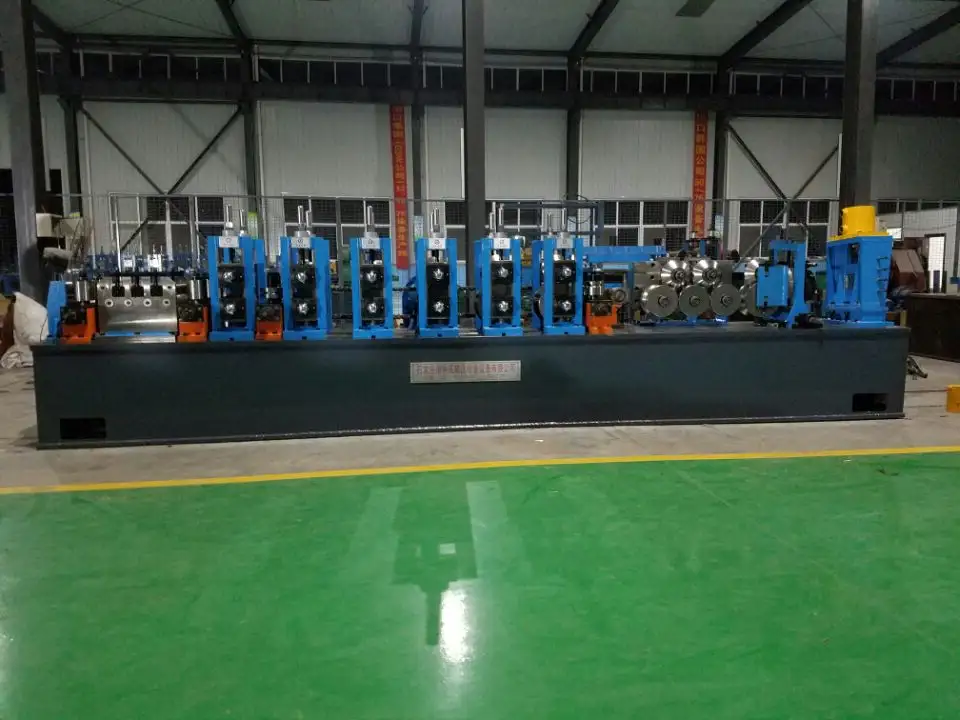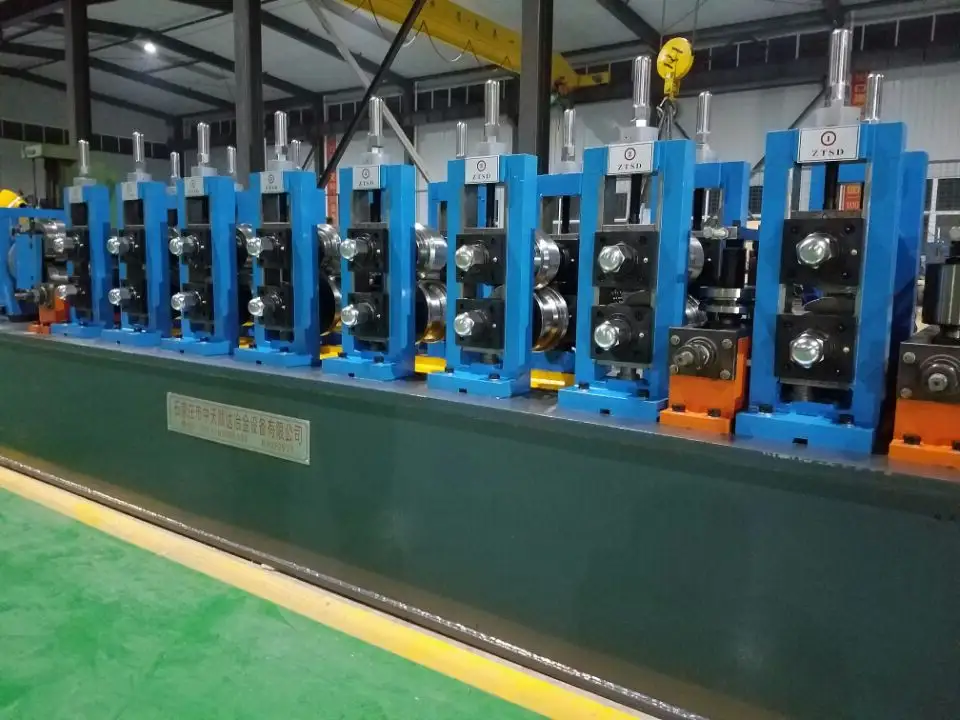The Revolutionary Impact of Modern Steel Pipe Manufacturing Technology
The steel pipe manufacturing industry has undergone a dramatic transformation with the introduction of advanced steel pipe making machines. These sophisticated pieces of equipment have become the backbone of efficient pipe production, enabling manufacturers to meet the growing global demand for high-quality steel pipes. In today's competitive market, these machines represent more than just production equipment – they are essential tools that define the success and sustainability of pipe manufacturing operations.
Modern steel pipe making machines combine precision engineering with automated capabilities, revolutionizing how manufacturers approach pipe production. The technology behind these machines has evolved significantly, offering unprecedented levels of accuracy, consistency, and productivity that manual manufacturing methods simply cannot match. As industries worldwide continue to expand their infrastructure needs, the role of these machines becomes increasingly critical in meeting market demands.
Core Components and Functionality of Steel Pipe Manufacturing Systems
Primary Machine Components
At the heart of every steel pipe making machine lies a complex system of integrated components working in perfect harmony. The forming section features precision rollers that gradually shape flat steel into cylindrical forms. The welding station, equipped with advanced welding technology, ensures strong and consistent seam joining. Quality control systems, including ultrasonic testing equipment, monitor the production process in real-time.
The cutting station incorporates high-precision blades that deliver clean, accurate cuts to specified lengths. Additionally, the machine's control system, typically powered by sophisticated PLC technology, coordinates all operations while maintaining precise tolerances throughout the manufacturing process.
Operational Excellence Features
Modern steel pipe making machines incorporate numerous features designed to optimize production efficiency. Automated material handling systems reduce labor requirements while improving safety. Smart sensors continuously monitor production parameters, allowing for immediate adjustments to maintain quality standards. The integration of digital controls enables operators to fine-tune settings with unprecedented accuracy.
Advanced cooling systems manage temperature control during welding and forming processes, ensuring structural integrity of the finished products. These features work together to minimize waste, reduce energy consumption, and maintain consistent product quality throughout extended production runs.

Production Efficiency and Quality Advantages
Enhanced Manufacturing Speed
The implementation of a steel pipe making machine dramatically increases production capacity compared to traditional methods. These systems can operate continuously at high speeds, producing hundreds of meters of pipe per hour while maintaining precise specifications. The automated nature of the process eliminates many of the bottlenecks associated with manual production methods.
Quick changeover capabilities allow manufacturers to switch between different pipe specifications with minimal downtime. This flexibility enables efficient response to varying customer demands while maximizing productive hours.
Superior Quality Control
Quality assurance takes center stage in modern pipe manufacturing through integrated testing and monitoring systems. Steel pipe making machines incorporate various inspection points throughout the production line, ensuring that every section of pipe meets stringent quality standards. Advanced testing methods, including X-ray and ultrasonic inspection, detect any imperfections before pipes leave the production line.
The consistency achieved through automated production significantly reduces the occurrence of defects common in manual manufacturing processes. This results in higher yield rates and fewer rejected products, ultimately improving the manufacturer's bottom line.
Economic Benefits and Return on Investment
Cost Efficiency Analysis
While the initial investment in a steel pipe making machine may be substantial, the long-term economic benefits far outweigh the costs. Reduced labor requirements, minimal material waste, and increased production efficiency contribute to significant operational savings. The precision of automated systems helps minimize raw material waste, optimizing resource utilization.
Energy efficiency features built into modern machines help reduce utility costs, while preventive maintenance capabilities extend equipment life and reduce unexpected downtime. These factors combine to provide an attractive return on investment for manufacturers.
Market Competitiveness
Manufacturers equipped with advanced steel pipe making machines gain a significant competitive advantage in the market. The ability to produce high-quality pipes consistently and efficiently allows companies to offer competitive pricing while maintaining healthy profit margins. The flexibility to quickly adjust production specifications helps manufacturers respond rapidly to changing market demands.
The enhanced quality control capabilities ensure that products meet or exceed industry standards, opening doors to high-value contracts and premium market segments. This technological advantage positions companies as reliable suppliers in an increasingly demanding global market.
Future Trends and Technological Advancements
Industry 4.0 Integration
The future of steel pipe manufacturing is being shaped by Industry 4.0 technologies. Modern steel pipe making machines are increasingly incorporating IoT sensors, artificial intelligence, and machine learning capabilities. These advanced features enable predictive maintenance, real-time quality control, and automated process optimization.
Digital twin technology is emerging as a powerful tool for simulating and optimizing production processes before implementation. This capability allows manufacturers to fine-tune operations virtually, reducing setup times and minimizing production risks.
Sustainability Innovations
Environmental considerations are driving innovations in steel pipe manufacturing technology. New generations of steel pipe making machines incorporate energy-efficient components and processes that reduce carbon footprint. Advanced recycling systems help recover and reuse materials, while improved welding technologies minimize emissions.
Manufacturers are also exploring green technologies such as solar power integration and water recycling systems to make their operations more sustainable. These innovations not only benefit the environment but also help companies meet increasingly stringent environmental regulations.
Frequently Asked Questions
What maintenance requirements does a steel pipe making machine have?
Regular maintenance includes daily cleaning of forming rollers, weekly calibration of welding equipment, monthly inspection of drive systems, and quarterly comprehensive system checks. Following a preventive maintenance schedule ensures optimal performance and extends equipment life.
How long does it take to train operators on a new steel pipe making machine?
Operator training typically requires 4-6 weeks for basic operation proficiency. Complete mastery, including troubleshooting and advanced features, may take 3-6 months. Many manufacturers offer comprehensive training programs and ongoing support.
What is the typical return on investment period for a steel pipe making machine?
Most manufacturers see a return on investment within 2-4 years, depending on production volume and market conditions. Factors affecting ROI include operational efficiency, maintenance costs, and market demand for finished products.
How does automation impact quality control in pipe manufacturing?
Automation significantly improves quality control through consistent production parameters, real-time monitoring, and integrated testing systems. This results in higher product quality, reduced defect rates, and improved customer satisfaction.
Table of Contents
- The Revolutionary Impact of Modern Steel Pipe Manufacturing Technology
- Core Components and Functionality of Steel Pipe Manufacturing Systems
- Production Efficiency and Quality Advantages
- Economic Benefits and Return on Investment
- Future Trends and Technological Advancements
- Frequently Asked Questions

